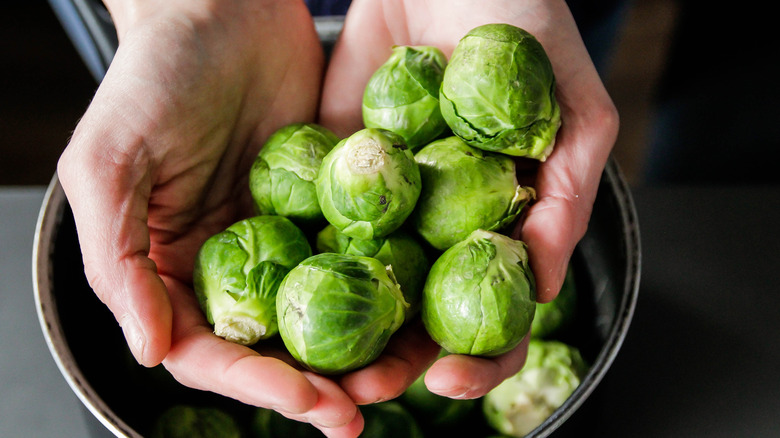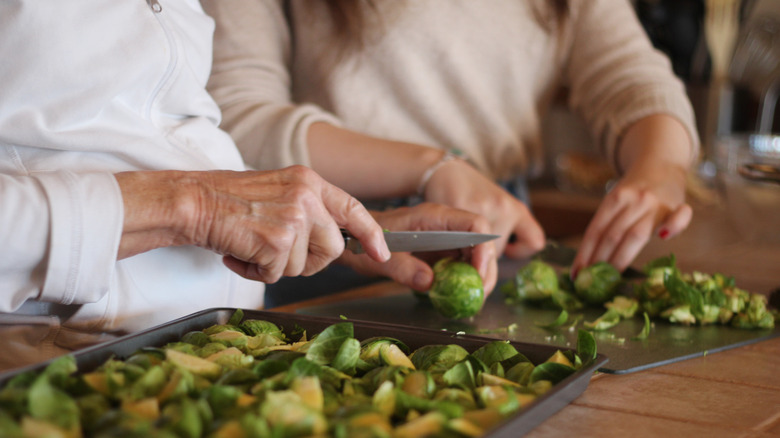One Of The Healthiest Vegetables You Can Eat Will Boost Heart Health, Improve Sleep, And Help You Poop
Pizza and ice cream might be your go-to comfort food, but sticking to foods like these can bring discomfort to your body in terms of chronic disease and inflammation. On the other hand, a diet rich in nutrient-packed vegetables supports your immune system to fight off chronic disease and the effects of stress.
Brussels sprouts may be low on your list of favorite vegetables, but you might reconsider adding Brussels sprouts for their vitamins, minerals, and other nutrients. A cup of Brussels sprouts packs 83% of your daily supply of vitamin C to help your body produce neurotransmitters and fight off free radicals. Brussels sprouts are also rich in potassium and low in sodium to help manage your blood pressure. You might be surprised to know that Brussels sprouts are a good source of tryptophan, providing 12% of your daily value for this sleep-inducing amino acid.
Brussels sprouts also have plant-based compounds that can impact your health. "There is a growing body of research looking at the anthocyanins and glucosinolates present in Brussels sprouts and other Brassicaceae vegetables," Maya Feller, a registered dietitian at Maya Feller Nutrition, tells Health Digest. "These phytochemicals are thought to be beneficial as they protect heart health, brain health, liver health, and more."
Plant-based compounds in Brussels sprouts that improve your health
Oxidative stress, caused by an excess of reactive oxygen species (ROS) in cells, can damage tissues and lead to conditions like high blood pressure and heart disease. When you eat cruciferous vegetables like Brussels sprouts, the glucosinolates break down into substances called isothiocyanates. These compounds activate your body's natural antioxidant defenses to protect your cells, according to a 2022 review in Molecules.
"Brussels sprouts are a meaningful source of fiber and contain soluble as well as insoluble fiber — both are beneficial for digestive health," Feller said. Fiber helps you poop by binding with water, adding bulk to your stool, and sweeping out waste in your colon. Brussels sprouts have more than 3 grams of fiber per cup, which will help you reach your daily recommended fiber intake of at least 25 grams.
You might not know that Brussels sprouts have 3 grams of protein per cup. Protein is made of amino acids, and Brussels sprouts provide all nine of the essential amino acids that your body can't make, including tryptophan. Tryptophan promotes sleep by helping your body make the neurotransmitter serotonin and the hormone melatonin. It's not necessary to eat foods rich in tryptophan before you go to bed. Instead, incorporating foods like Brussels sprouts into your diet can help your body regulate your sleep cycle.
How to cook Brussels sprouts to keep their nutrients
Raw Brussels sprouts might make you wince, but how you cook Brussels sprouts can affect their antioxidant power. According to a 2021 review in Frontiers in Nutrition, glucosinolates activate an enzyme called myrosinase when Brussels sprouts are chopped or chewed. This enzyme is essential in breaking down the glucosinolates into the antioxidant and anti-inflammatory isothiocyanates. However, cooking Brussels sprouts in high heat, such as boiling or frying, deactivates the myrosinase enzyme. It's better to steam Brussels sprouts to preserve these antioxidants.
Before cooking Brussels sprouts, rinse them first to remove any dirt and debris. You'll also want to cut off the base of each sprout and peel off any brown or loose outer leaves. Depending on the size of your Brussels sprouts, you can cut them in half or leave them whole so they'll cook more quickly. Fill a pot or a saucepan with about half an inch of salted water and bring to a boil. Place the Brussels sprouts in a steamer and place the steamer above the boiling water, then reduce to medium-low heat. Steam the Brussels sprouts for about five minutes or until tender. Feller likes to roast her Brussels sprouts with butternut squash, onion, a little maple syrup, and chili powder for her Maple Chili Glazed Butternut Squash dish.


